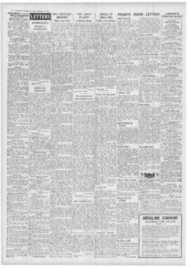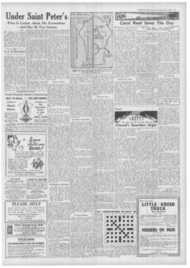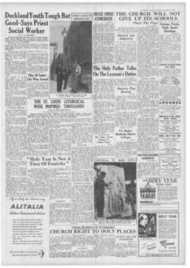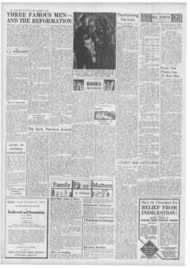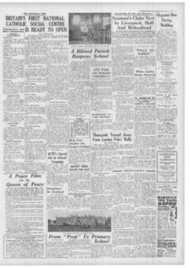Page 3, 9th September 1949
Page 3

Report an error
Noticed an error on this page?If you've noticed an error in this article please click here to report it.
Tags
Share
Related articles
Theatre
Theatre By Jonathan Kemp
Theatre
The Play
Mini M E O S Le
Elwood's Guardian Angel
A GREAT clown has come to London, Mr, Joe E. Brown, who is now playing Elwood P. Dowd in Miss Mary Chase's Harvey (PgiNcE OF WALES) is the nearest thing to an articulate Grock we shall see.
His comedy, his air of solemn perturbation, is delicately infused with pathos; his gaucherie is dignified: he has that gentle sense of being inadequate, because he is alone, that is the mark of the great buffoons. The face is clownish, ageless and wrinkled, with eyes like currants in an oblong face slashed with a long flexible mouth; the thin black hair seems painted on a puppet's skull. His every gesture makes him one with his audience. His characterisation of Elwood is so catholicly conceived, so economically elaborated and played with such precision that it attains theological depth. The story is simple. There are two heroes. The one we see is Elwood who, like Willy Loman in Death of a Salesman, is an ordinary man. He is a nonentity. He has not been divorced from a film actress; he has not swum the channel; in the cause of racial purity, social unity or democratic enlightenment he has killed not one man. We don't know his politics. He just likes to sit around and talk to the other customers in bars with convivial names like Charley's Place. He is a mellow souse, not a dipso
maniac. The oddest thing about Elwood is that he is maniacal about nothing; he is without anxiety. Traffic lights don't worry him; he toils not neither does he spin; he is gentle, courteous and he loves beauty and good living.
But he has one weakness; he sees things that are invisible to others. To be exact, he sees Harvey.
Harvey is a white rabbit. six feet tall. whom Elwood encountered one evening leaning against a lamp-post. They became fast friends and go everywhere together. The play cleats with an attempt by the little man's family to have hirn locked up in a Lunatic asylum. On the surface this looks like a cruel farce about mental derangement. But in the hands of this author arid interpreted by Mr. Brown it becomes a tender, ironic comment on the deeper lunacy of the world.
Mr. Brown creates this comment; his performance is completely integrated. He makes a man. When first we see him. he and Harvey have arrived home unexpectedly. Elwood stalks across stage with a curious, cautious, ponderous, yet modest, dignity; he places two hats upon a table and looks carefully over his shoulder; then with old-world grace he moves aside to let someone else pass, someone we cannot see. The deliberation seems overdone. But soon Mr. Brawn puts it in character. Each person he meets, asylum doctor, moronic warder, taxi-driver, nurse or strange lady he approaches with the same exquisite care. He bows low. He is absorbed in their
personalities. This, his demeanour says, is a human being. a mystery, lovable but unfathomable. He asks questions about work and family. He is delighted to meet you—and he means it. You are a person.
Most of his friends, he tells us, he meets in bars; and he gently Corrects the doator who asks if they tell him their " little troubles." "Solitary people in bars don't have tittle troubles, doctor."
It is in the second act, when he explains Elwood's association with Harvey, that Mr. Brown's performance touches greatness. Laughter in great waves was cascading down from the gallery over the great theatre and breaking upon the stage. In a flash be stilled it to silence. That much abused organ, the Brown mouth, became oboe, flute and muted trumpet. He told how Harvey first said to him "G00000000d evening, Mr. Dowd." He 'explained that he had never known anyone else with this name; it was not his father's name nor had he a friend called Harvey. But it had always been his favourite name, perhaps because he knew no one who had it. He told the rabbit this, and it replied: "What a coincidence, my name is Harvey."
There was no psychological explanation. Elwood is rational, lovable, honest and a man, yet, oddly, he has become as a little child. He is happy. Children love white rabbits and the doors begin to open and shut for Harvey's passage. Surely he can be only Elwood's guardian angel. This is a very good play and Mr. Brown, I repeat, is an actor who is worthy of his place with the great comedians.
Sadly one reports that Mr. M. J. Molloy's fine play The King of Friday's Men (LYRIC, HAMMERSMITH) IS SO distorted by had playing, that its Catholic depths are lost. The story of the great fighter of Tyrawley who asked, at the raising of the chalice, during the Mass, for a wife, got one and lost her is beautifully written. But Mr. Niel! McGinnis, while sincere in his approaCh, is not a good enough actor to encompass the part. Mr. Liam Redmond and Mr. Joe Linnane treated us to' the sort of stage lrishry that I thought had gone out with Chalmers Mackay. When the former essayed pathos he got laughter. He earned it, Miss Ingrid Burke, a young English, actress, was wholly commendable.
Miss Siobhan Mackenna—who has promise of becoming a grand tragic actress—Mr. George Relph and Mr, Michael Gough distinguish by their acting Faded Mansion (Ductless) a translation from the French to the Irieh. But the current Gallic fashion for the death wish in drama rests uneasily in an Irish setting. The Celt crossed in love drowns his sorrows more often than himself.
It is a pity that a better play than Mr. Douglas Home's pedestrian and cliche-ridden Master of Arts (STRAND) was not available for Mr. Roland Culver when he returned home after his sojourn in Hollywood. But the master of the sliding eye-brow, the flat, lush, musical voice and the collapsible legs is still the magician who makes bad material entertaining. Mr. David O'Brien as a juvenile Captain Foulenough helped to make this school " comedy " tolerable. Mr. Home can do, one hopes, no worse.
W. J. I.
blog comments powered by Disqus



